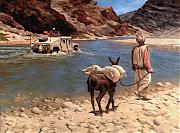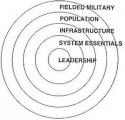... The nuclear strategist Herman Kahn pondered this problem in a 1983 essay on "multipolarity and stability." Kahn made his name by "thinking about the unthinkable" -- namely, the consequences of nuclear war between the United States and the Soviet Union. But he recognized that the bipolar world of the Cold War had an inherent stability. The two superpowers understood the rules of the game, and because the dangers of conflict were so great, they learned to discipline themselves and their respective allies.
A multipolar world eventually would be stable, too, Kahn argued. He hypothesized that by 2000, there would be seven economic giants -- the United States, Japan, the Soviet Union, China, Germany, France and Brazil -- and that they would gradually work out orderly rules. The problem was the transition. The moment of maximum danger, Kahn warned, would be in moving from a bipolar to a multipolar world.
We are now in that process of transition, and it's proving just as volatile as Kahn predicted. American power alone is demonstrably unable to achieve world order; we can't even maintain the peace in Baghdad. But no multilateral coalition has emerged as an alternative. The United Nations, the nominal instrument of collective security, allowed itself to be run out of Iraq by a terrorist bomb in the early months of the war...









 ).
). 

Bookmarks